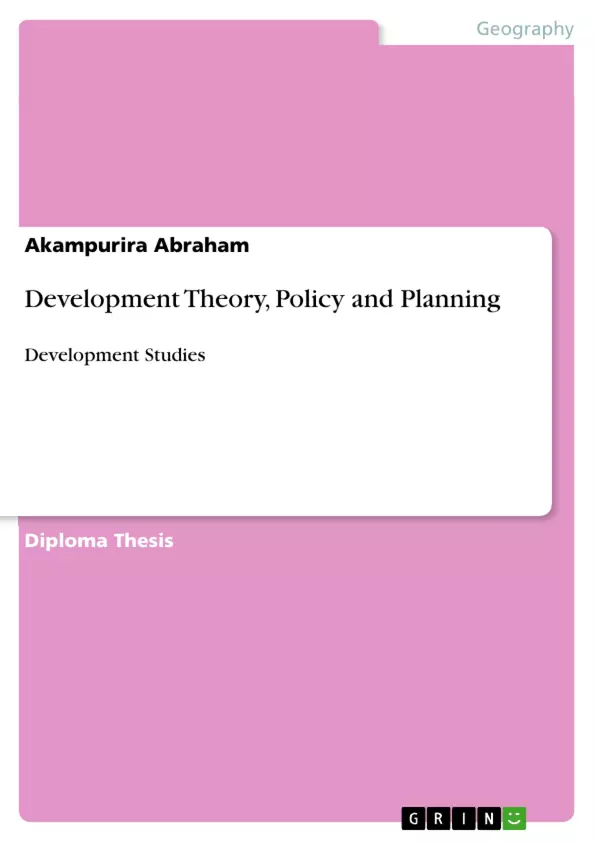It is the wish of every community and every nation to move from one stage of development to another. Development is holistic approach that involves structural institutional changes and social economic transformation, in addition to increased outputs and incomes. Development also encompasses change in peoples’ customs and beliefs that are a hindrance to development programs. Economic growth involves urbanization, industrialization and increased and appropriate use of technology in all sectors of the economy. The government major role is to provide good welfare to its citizens. It is also obliged to facilitate economic players to actively participate in economic activity through provision of infrastructure. All this is done through the process of development theory, policy and planning.
Inhaltsverzeichnis (Table of Contents)
- Chapter One
- Chapter Two
- Chapter Three
- Chapter Four
- Chapter Five
- Chapter Six
- Chapter Seven
Zielsetzung und Themenschwerpunkte (Objectives and Key Themes)
This paper aims to explore the aspects of development theory, policy, and planning crucial for sustainable development in developing countries. It examines the challenges of poverty, low income, and the need for effective policy planning to increase national income and break the cycle of poverty. The course material helps students understand development planning objectives and the impact of policy on achieving sustainable economic growth.
- Development theory and its application to real-world scenarios
- The role of policy in achieving sustainable economic growth
- Poverty reduction strategies and their effectiveness
- The relationship between economic and political change
- The process of public policy making and its influencing factors
Zusammenfassung der Kapitel (Chapter Summaries)
Chapter 1: This chapter introduces the concept of development as a holistic process encompassing structural, institutional, and socioeconomic transformations. It highlights the challenges faced by developing countries, characterized by high poverty levels, low national income, and a vicious cycle of poverty. The chapter emphasizes the critical role of proper policy and planning in breaking this cycle and achieving sustainable development.
Chapter 2: This chapter delves into the concept of theory as a simplified representation of social, economic, and political realities. It categorizes theories into conceptual, explanatory, predictive, and policy theories, illustrating their applications in development contexts. The chapter also explores different theoretical frameworks, including social-economic theories (like poverty reduction theories) and theories of public policy-making, emphasizing the influence of various actors such as government, donors, communities, and civil society organizations on policy agendas. The question of whether poverty can be reduced without the poor's direct influence on the policy agenda is particularly highlighted.
Schlüsselwörter (Keywords)
Development theory, policy planning, sustainable development, poverty reduction, economic growth, political change, public policy, social-economic change, good governance.
Frequently Asked Questions: Comprehensive Language Preview
What is the purpose of this document?
This document provides a comprehensive preview of a language course or textbook. It includes a table of contents, objectives and key themes, chapter summaries, and keywords, allowing for a thorough understanding of the material covered.
What topics are covered in this language course or textbook?
The course focuses on development theory, policy, and planning, specifically within the context of sustainable development in developing countries. Key themes include poverty reduction, strategies for increasing national income, the role of effective policy planning, and the relationship between economic and political change. The course also explores various theoretical frameworks and the complexities of public policy-making.
What are the main objectives of this course?
The primary objective is to help students understand the crucial aspects of development theory, policy, and planning for achieving sustainable development. Students will learn about the challenges of poverty and low income, the importance of effective policy planning for economic growth, and the impact of policy on sustainable development goals.
What are the key themes explored in the course?
Key themes include development theory and its practical application, the role of policy in achieving sustainable economic growth, effective poverty reduction strategies, the interplay between economic and political change, and the process and influencing factors of public policy-making.
What is covered in each chapter?
Chapter 1: Introduces the concept of development as a holistic process and highlights the challenges faced by developing countries, emphasizing the crucial role of policy and planning in achieving sustainable development. Chapter 2: Explores different theoretical frameworks for understanding development, including social-economic theories and theories of public policy-making, and examines the influence of various actors on policy agendas. It specifically addresses the question of poverty reduction and the involvement of the poor in the policy process.
What are the key words associated with this course?
Key words include: Development theory, policy planning, sustainable development, poverty reduction, economic growth, political change, public policy, social-economic change, good governance.
What is the overall structure of the document?
The document is structured to provide a concise overview. It starts with a table of contents, followed by a statement of objectives and key themes, chapter summaries, and finally a list of keywords.
- Quote paper
- Akampurira Abraham (Author), 2011, Development Theory, Policy and Planning, Munich, GRIN Verlag, https://www.grin.com/document/207232



